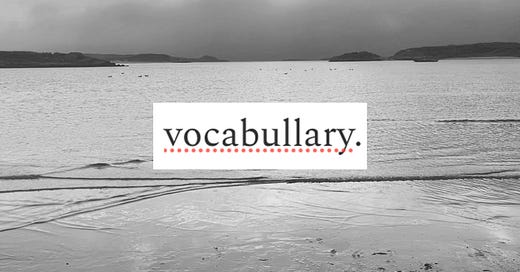Ní bhíonn saoi gan locht.
There is no wiseman without fault.
- Irish Proverb
Although I have grown a lot in my view on mistakes, I’ve noticed I still feel differently when I make a mistake in Irish than how I do in English. Look at any of my early drafts for articles in English and you’ll find a sea of red squiggly lines.
When I realized I wrote “vocbaulary” followed directly by “vocabularly” I laughed. I didn’t think I’m stupid or that I speak english poorly.
I saw it for what it was - a simple typo.
A typo made for the most beautiful of reasons - when I write, I am channeling thoughts and feelings into words. The finer details like spelling and punctuation can be corrected later.
However, when I make mistakes in Irish, I feel a sense of guilt and shame rise up within me.
So why is that? If anything, I should be even more forgiving of myself for making mistakes in Irish. I have only been learning the language for five years. Of course I am going to make mistakes. I’ve been speaking English for thirty two years. I have no excuse.
When I make a mistake in English, I can laugh at it because I know that it was a silly mistake. I never doubt that I know how to spell vocabullary. (Gotcha!) I know that I “write a paper” and “turn right” at the next stop sign. When I realize someone else may have seen one of my mistakes or typos, I don’t assume they’re questioning my English ability.
While I still may make mistakes after 32 years spent speaking English, I also have 32 years of evidence that I can speak English. I don’t doubt myself. At the end of the day, I am certain I speak the language.
At this time five years ago, I was struggling to construct some of my first sentences in Irish. Of course I still make mistakes! Of course I forget things I’ve already been taught! And of course I still make the same careless mistakes and typos I do in English!
And yet, I hold myself to a higher standard than is fair.
At the heart of this dichotomy is my sense of security in both languages.
You can’t convince me I don’t speak English fluently. I can’t remember a point in my life where I didn’t know English. So when I make mistakes, I don’t feel like they reflect my ‘level of English.’ They’re just funny typos, or words I somehow didn’t know for over three decades, or grammar I intentionally avoid because I can’t be bothered to actually relearn something I was taught twenty years ago and forgot.
However, I remember not speaking Irish at all. I remember worrying that what I said didn’t make any sense. I remember making the same mistake again and again despite being corrected a hundred times. When I make mistakes, I do feel like they reflect my level of Irish.
When I say a wrong word in English… wow, I must be tired. Haha. When I say a wrong word in Irish… wow, I thought I was better than that.
I have written about how fluency is not an end point, and yet, in many ways, I have treated myself like it is. You should have known that. You shouldn’t have made that mistake. Why don’t you know that word?
Why would I?
At some point, I forgot that I am still learning. I forgot that it makes perfect sense that I make mistakes and don’t know everything in Irish. My identity as a native English speaker has shielded me from my shame of making mistakes in English, so now I think it’s time that I let my identity as a foghlaimeoir - learner - do the same.
Upcoming from Foghlaimeoir:
Saturday: Irish translation of this article
Wednesday: Special Announcement 👀
More ways to support my work:
You can join my paid community for as little as $5 for exclusive content like my complete guide to learning Irish, audio versions of Irish language posts, and more! Click here to upgrade!
Prefer to make a one time contribution? Click here to buy me a coffee!
Also, check out GaeilgeiMoChroi.com to get Irish language themed mugs, sweaters, journals and more that I helped create!






There is another reason for greater care and also greater shame at errors in Irish: like all minority languages, errors have the potential to mislead more easily than in widespread languages. I'd suggest that yes, there is a moral aspect to this - our indebtedness to previous generations that have passed on this wonderful cultural gift. The shame at errors is part of bearing this cultural gift so that is passed on to future generations.